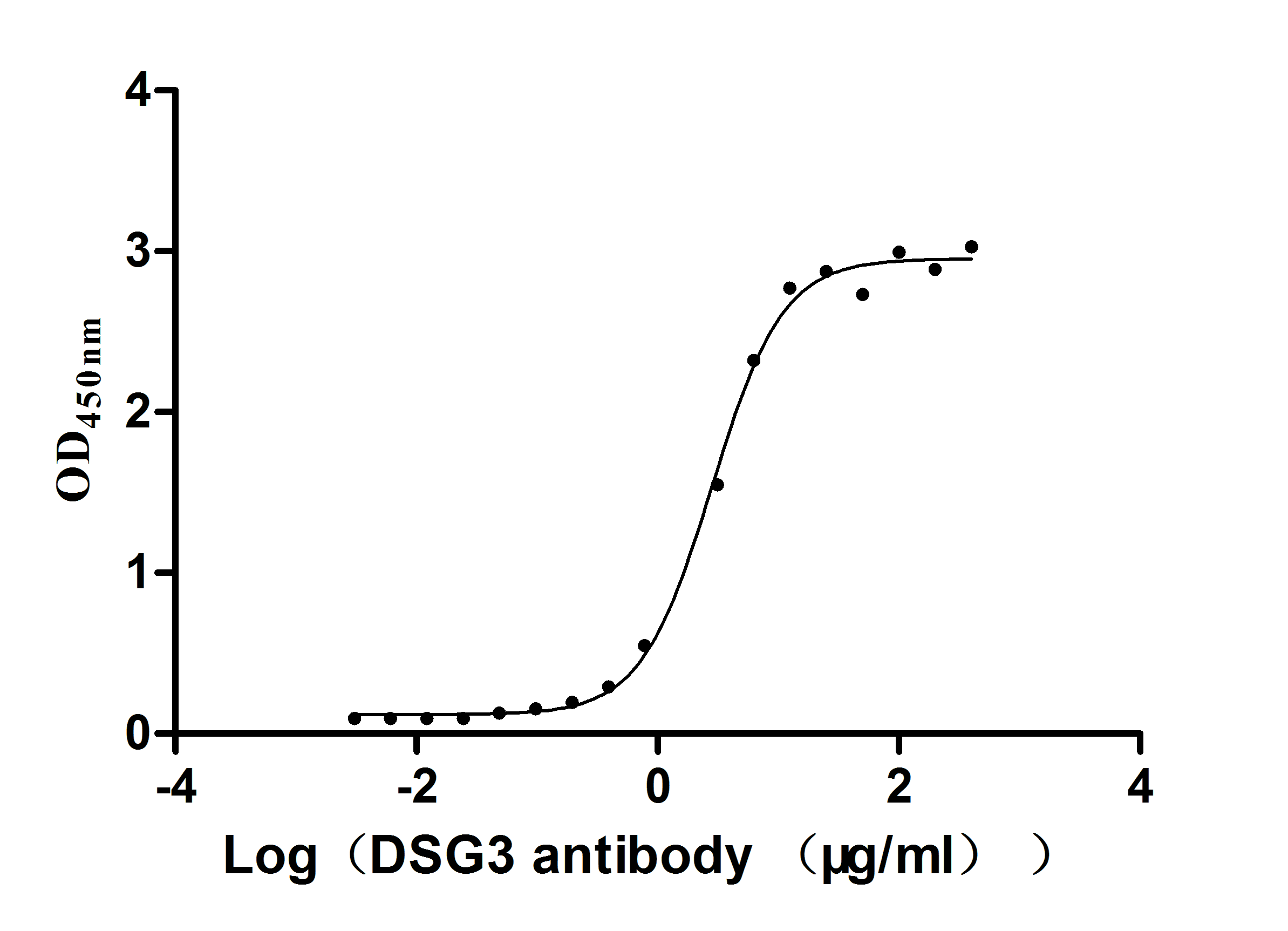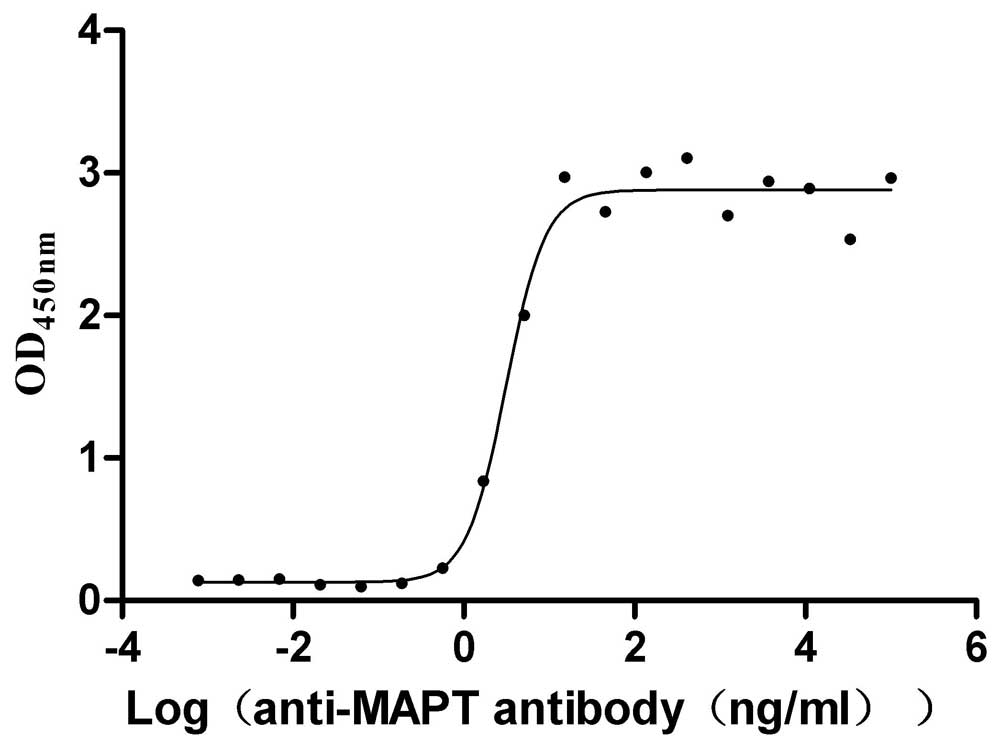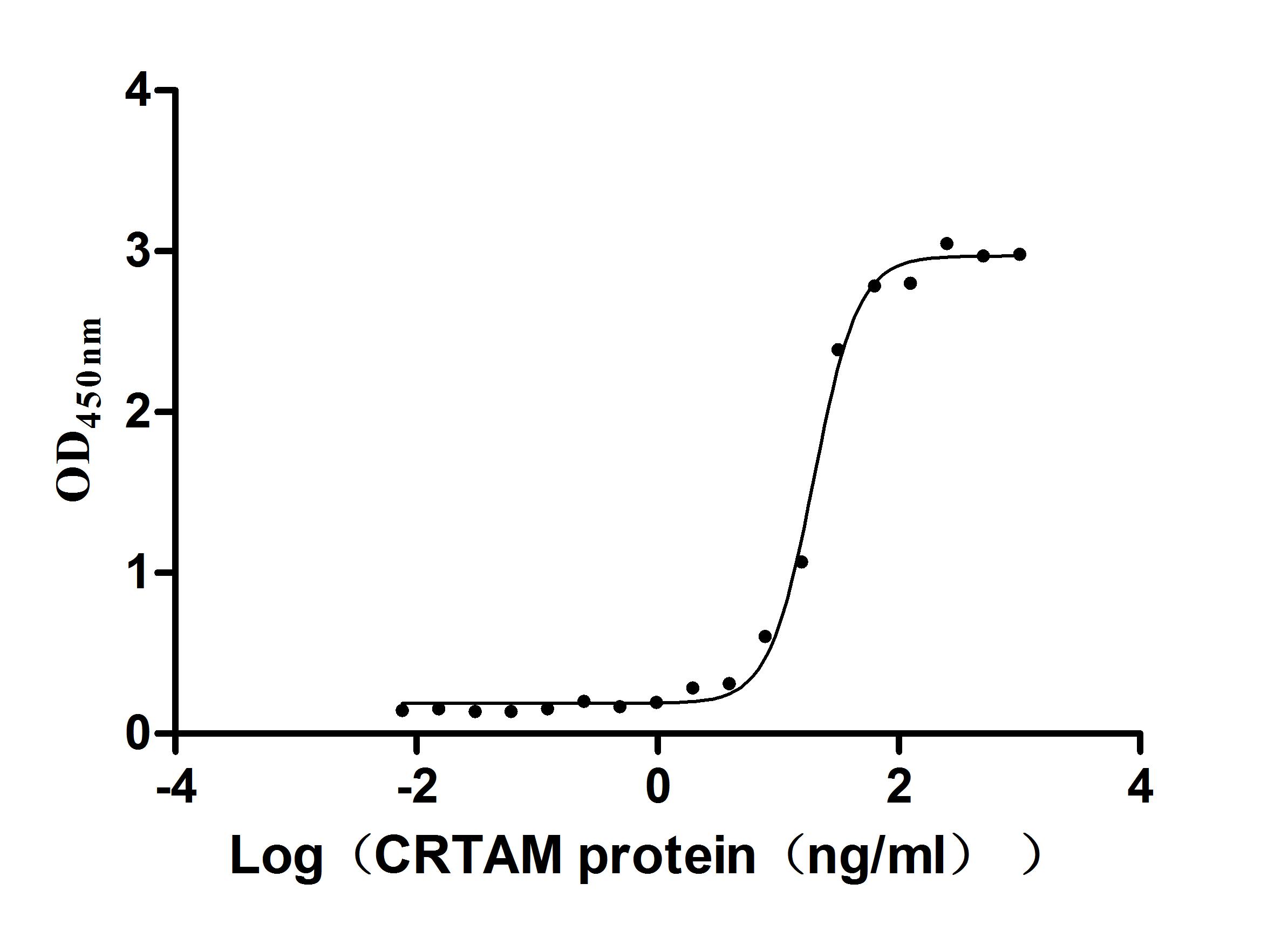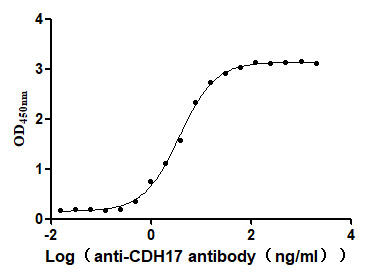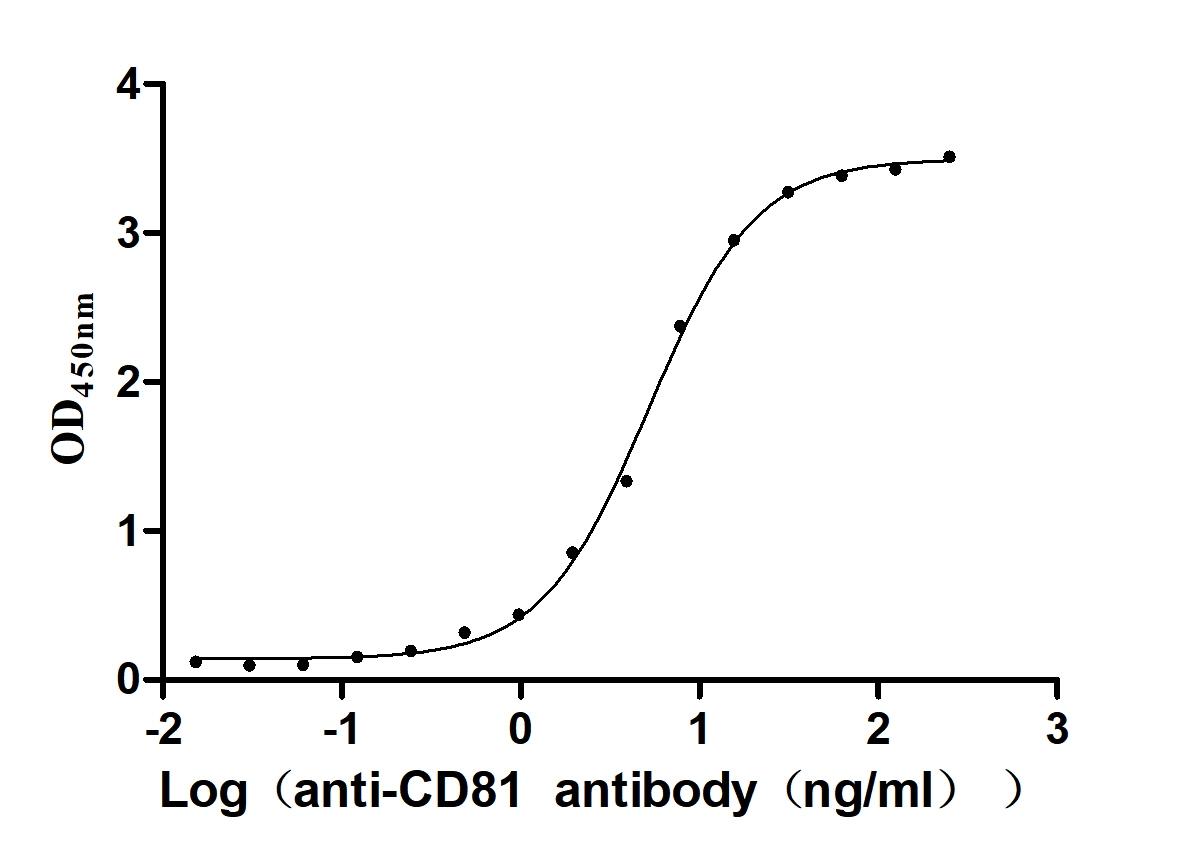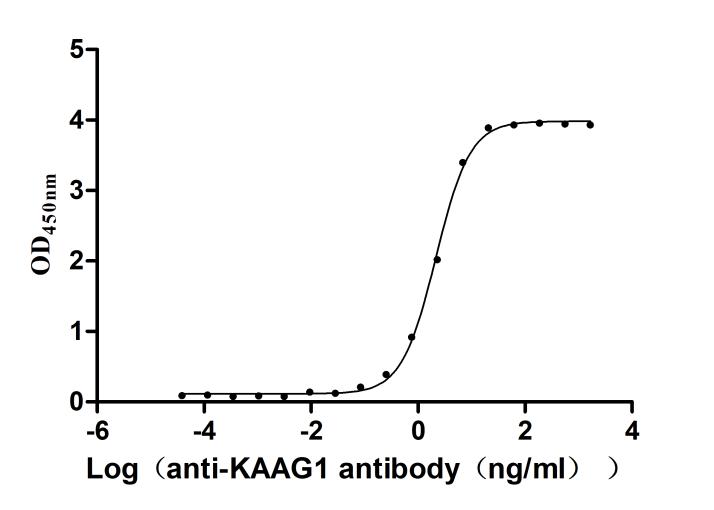Recombinant Human Heat shock-related 70 kDa protein 2 (HSPA2)
-
中文名称:人HSPA2重组蛋白
-
货号:CSB-YP010824HU
-
规格:
-
来源:Yeast
-
其他:
-
中文名称:人HSPA2重组蛋白
-
货号:CSB-EP010824HU
-
规格:
-
来源:E.coli
-
其他:
-
中文名称:人HSPA2重组蛋白
-
货号:CSB-EP010824HU-B
-
规格:
-
来源:E.coli
-
共轭:Avi-tag Biotinylated
E. coli biotin ligase (BirA) is highly specific in covalently attaching biotin to the 15 amino acid AviTag peptide. This recombinant protein was biotinylated in vivo by AviTag-BirA technology, which method is BriA catalyzes amide linkage between the biotin and the specific lysine of the AviTag.
-
其他:
-
中文名称:人HSPA2重组蛋白
-
货号:CSB-BP010824HU
-
规格:
-
来源:Baculovirus
-
其他:
-
中文名称:人HSPA2重组蛋白
-
货号:CSB-MP010824HU
-
规格:
-
来源:Mammalian cell
-
其他:
产品详情
-
纯度:>85% (SDS-PAGE)
-
基因名:
-
Uniprot No.:
-
别名:70kDa; Hcp70.2; Heat shock 70 kDa protein 2; Heat shock protein 2; Heat shock protein 70.2; Heat shock related 70 kDa protein 2; Heat shock-related 70 kDa protein 2; Heat-shock protein, 70-KD, 2; Heat-shock protein, 70-KD, 3; HSP70 2; HSP70 3; Hsp70-2; HSP70-3; HSP70.2; HSP70A2; HSP72; HSP72_HUMAN; HSPA2; Hspt70; Hst70; MGC58299; MGC7795; MGC93458; OTTHUMP00000180664 ; Testis-specific heat shock protein-related
-
种属:Homo sapiens (Human)
-
蛋白长度:Full length protein
-
表达区域:1-639
-
氨基酸序列MSARGPAIGI DLGTTYSCVG VFQHGKVEII ANDQGNRTTP SYVAFTDTER LIGDAAKNQV AMNPTNTIFD AKRLIGRKFE DATVQSDMKH WPFRVVSEGG KPKVQVEYKG ETKTFFPEEI SSMVLTKMKE IAEAYLGGKV HSAVITVPAY FNDSQRQATK DAGTITGLNV LRIINEPTAA AIAYGLDKKG CAGGEKNVLI FDLGGGTFDV SILTIEDGIF EVKSTAGDTH LGGEDFDNRM VSHLAEEFKR KHKKDIGPNK RAVRRLRTAC ERAKRTLSSS TQASIEIDSL YEGVDFYTSI TRARFEELNA DLFRGTLEPV EKALRDAKLD KGQIQEIVLV GGSTRIPKIQ KLLQDFFNGK ELNKSINPDE AVAYGAAVQA AILIGDKSEN VQDLLLLDVT PLSLGIETAG GVMTPLIKRN TTIPTKQTQT FTTYSDNQSS VLVQVYEGER AMTKDNNLLG KFDLTGIPPA PRGVPQIEVT FDIDANGILN VTAADKSTGK ENKITITNDK GRLSKDDIDR MVQEAERYKS EDEANRDRVA AKNALESYTY NIKQTVEDEK LRGKISEQDK NKILDKCQEV INWLDRNQMA EKDEYEHKQK ELERVCNPII SKLYQGGPGG GSGGGGSGAS GGPTIEEVD
-
蛋白标签:Tag type will be determined during the manufacturing process.
The tag type will be determined during production process. If you have specified tag type, please tell us and we will develop the specified tag preferentially. -
产品提供形式:Lyophilized powder
Note: We will preferentially ship the format that we have in stock, however, if you have any special requirement for the format, please remark your requirement when placing the order, we will prepare according to your demand. -
复溶:We recommend that this vial be briefly centrifuged prior to opening to bring the contents to the bottom. Please reconstitute protein in deionized sterile water to a concentration of 0.1-1.0 mg/mL.We recommend to add 5-50% of glycerol (final concentration) and aliquot for long-term storage at -20℃/-80℃. Our default final concentration of glycerol is 50%. Customers could use it as reference.
-
储存条件:Store at -20°C/-80°C upon receipt, aliquoting is necessary for mutiple use. Avoid repeated freeze-thaw cycles.
-
保质期:The shelf life is related to many factors, storage state, buffer ingredients, storage temperature and the stability of the protein itself.
Generally, the shelf life of liquid form is 6 months at -20°C/-80°C. The shelf life of lyophilized form is 12 months at -20°C/-80°C. -
货期:Delivery time may differ from different purchasing way or location, please kindly consult your local distributors for specific delivery time.Note: All of our proteins are default shipped with normal blue ice packs, if you request to ship with dry ice, please communicate with us in advance and extra fees will be charged.
-
注意事项:Repeated freezing and thawing is not recommended. Store working aliquots at 4°C for up to one week.
-
Datasheet :Please contact us to get it.
相关产品
靶点详情
-
功能:Molecular chaperone implicated in a wide variety of cellular processes, including protection of the proteome from stress, folding and transport of newly synthesized polypeptides, activation of proteolysis of misfolded proteins and the formation and dissociation of protein complexes. Plays a pivotal role in the protein quality control system, ensuring the correct folding of proteins, the re-folding of misfolded proteins and controlling the targeting of proteins for subsequent degradation. This is achieved through cycles of ATP binding, ATP hydrolysis and ADP release, mediated by co-chaperones. The affinity for polypeptides is regulated by its nucleotide bound state. In the ATP-bound form, it has a low affinity for substrate proteins. However, upon hydrolysis of the ATP to ADP, it undergoes a conformational change that increases its affinity for substrate proteins. It goes through repeated cycles of ATP hydrolysis and nucleotide exchange, which permits cycles of substrate binding and release. Plays a role in spermatogenesis. In association with SHCBP1L may participate in the maintenance of spindle integrity during meiosis in male germ cells.
-
基因功能参考文献:
- HSPA2 may play an important role in tumor progression, and serve as a potential biomarker for the prediction of adverse prognosis in pancreatic carcinoma PMID: 28416384
- HSPA2 appears to be necessary for controlling development of properly stratified epidermis and thus for maintenance of skin homeostasis. PMID: 28786487
- This study showed that a strong association between rs2227956 polymorphism and MS risk, which is independent from the association with HSP70-2 rs1061581, and a significant link between hsp70-hom protein expression and multiple sclerosis severity. PMID: 27609295
- The data suggest that seminal plasma HSPA2 Cell-free mRNA is different between asthenozoospermic and normozoospermic individuals and it might be an indicator for semen quality. PMID: 27209630
- ACE and PDIA6 were identified as potential HSPA2-interacting proteins; this assemblage resides in membrane raft microdomains located in the peri-acrosomal region of the sperm head. PMID: 26676989
- Results suggest that overexpression of HSPA2 in pancreatic cancer is associated with aggressive progression and poor prognosis and that HSPA2 may be served as a prognostic marker. PMID: 25890028
- we consider the evidence supporting the role of HSPA2 in sperm function and explore the potential mechanisms by which it is depleted in the spermatozoa of infertile patients--{REVIEW} PMID: 25865850
- The fertilization rate with ICSI is associated with HspA2 expression in the testis from which sperm retrieved and the alteration of HspA2 expression has been involved in spermatogenic impairment. PMID: 25308252
- High expression of HSPA2 is associated with hepatocellular carcinoma. PMID: 25117073
- HSP70-2 +1267 polymorphism may influence the risk of coronary artery disease (CAD) in Iranian population, however further studies are needed to clarify the role of other HSP70-2 gene polymorphisms in the pathogenesis of the CAD. PMID: 25108126
- High HSPA2 expression is associated with non-small cell lung carcinoma. PMID: 24922646
- Genotype analysis of HSP70-2 (+1267 A/G) polymorphism revealed a significant association between the minor allele G and presence of Multiple Sclerosis PMID: 24485944
- Overexpression of HSPA2 is correlated with esophageal squamous cell carcinoma. PMID: 23777267
- HSPA2 regulates the expression of sperm surface receptors involved in human sperm-oocyte recognition, such as arylsulfatase A and SPAM1. PMID: 23247813
- Heat-shock protein A2(HSPA2) expression significantly correlates with sperm concentration and morphology thus aberrant HSPA2 expression may play an important role in capacitation and fertilisation processes PMID: 22670834
- The interaction between SPAM1, ARSA and HSPA2 in a multimeric complex mediating sperm-egg interaction. PMID: 23209833
- It appears that polymorphism of HSP70-2 gene is not directly associated with the susceptibility to peptic ulcer diseases but BB genotype is associated with an increased risk of duodenal ulcer in older subjects in the Japanese population. PMID: 22353510
- In somatic cells HSPA2 can be a part of a system protecting cells against cytotoxic stimuli inducing proteotoxic stress. PMID: 22397456
- The results clearly show that certain human tissues constitutively express varying levels of HSPA2 protein in a highly differentiated way. PMID: 21373891
- GDF15, HSPA2, TMEFF2, and VIM were identified as epigenetic biomarkers for Bladder cancer. PMID: 20975101
- The HspA2 gene was down-regulated in sperm from infertile men with idiopathic oligoteratozoospermia, suggesting that such anomalies of gene expression might be associated with pathogenesis in some subtypes of male infertility. PMID: 16517558
- This is the first report on HSPA2 gene expression in ejaculated spermatozoa from adolescents and its relationship with varicocele pathology. PMID: 17007855
- Delineation of the minimal promoter is a basic step toward identifying the cis and trans elements involved in the regulation of the HSPA2 gene expression, especially in cancer cells. PMID: 17369882
- results indicate that the there may be no association of the HSP70-2 gene polymorphism with ankylosing spondylitis in Chinese Han population PMID: 17922431
- The HspA2, like Hsp70 protein, can be involved in protecting nucleoli and centrosomes integrity in cancer cells subjected to heat shock and, possibly, other cellular stressors. PMID: 18452162
显示更多
收起更多
-
亚细胞定位:Cytoplasm, cytoskeleton, spindle.
-
蛋白家族:Heat shock protein 70 family
-
数据库链接:
HGNC: 5235
OMIM: 140560
KEGG: hsa:3306
STRING: 9606.ENSP00000247207
UniGene: Hs.432648
Most popular with customers
-
Recombinant Mouse Desmoglein-3 (Dsg3), partial (Active)
Express system: Mammalian cell
Species: Mus musculus (Mouse)
-
Recombinant Macaca mulatta Microtubule-associated protein tau (MAPT) (Active)
Express system: Mammalian cell
Species: Macaca mulatta (Rhesus macaque)
-
Recombinant Human Zymogen granule protein 16 homolog B (ZG16B) (Active)
Express system: Mammalian cell
Species: Homo sapiens (Human)
-
Recombinant Human Desmoglein-3 (DSG3), partial (Active)
Express system: Baculovirus
Species: Homo sapiens (Human)
-
Recombinant Human Cell adhesion molecule 1 (CADM1), partial (Active)
Express system: Mammalian cell
Species: Homo sapiens (Human)
-
Recombinant Human Cadherin-17 (CDH17), partial (Active)
Express system: Mammalian cell
Species: Homo sapiens (Human)
-
Recombinant Human CD81 antigen (CD81), partial (Active)
Express system: Mammalian cell
Species: Homo sapiens (Human)
-
Recombinant Human Kidney-associated antigen 1(KAAG1) (Active)
Express system: E.coli
Species: Homo sapiens (Human)


